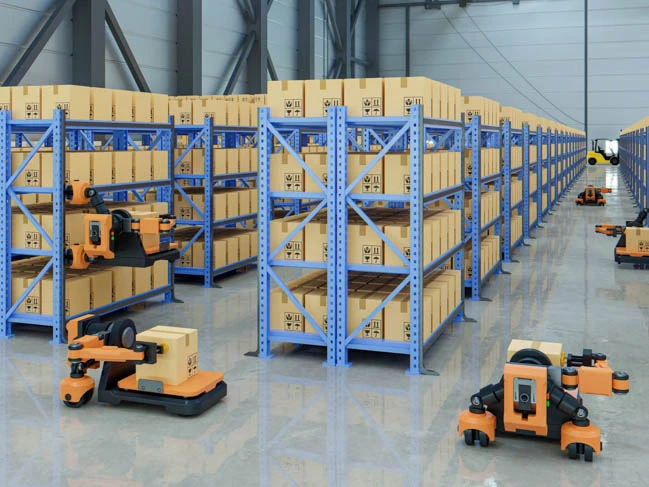Blog / The Supply Chain Tech Revolution: How to Keep Up With the Changes
The Supply Chain Tech Revolution: How to Keep Up With the Changes

Supply Chain Management Professional Diploma
- Supply Chain Management
- Shipping Coordinator
- Purchasing Agent
- Warehouse Supervisor
Table of Contents
Supply Chain Management is undergoing a major tech revolution – sometimes referred to as Industry 4.0. Across the supply chain sector, tools like blockchain, robotics, and artificial intelligence (AI) are being adopted to improve processes and drive resilience. Think: cutting-edge automated sorting systems, market intelligence dashboards, and predictive analytics.
While robotics and AI will never eliminate the need for human employees, this technology is already redefining the value workers bring to the field and the skills they’ll need to advance in their careers.
If you’re currently employed in Supply Chain Management, or planning to transition into this growing sector, now’s the time to dig deeper into how you can prepare for tomorrow’s technological landscape. It’s approaching sooner than you think.
What is Supply Chain Management?
Supply Chain Management oversees the sourcing, manufacturing, transportation, warehousing, and distribution of goods and services. For example, the t-shirt you’re wearing began as raw materials (like cotton or fibre), which were made into fabric. That fabric was used to manufacture your t-shirt, which was shipped to a warehouse, and distributed at your favourite clothing store. Businesses rely on Supply Chain Management Professionals to ensure this process runs efficiently and cost-effectively.
Supply Chain Management Professionals work at all stages of the supply chain, in roles related to coordination, operations, logistics, and analysis. In today’s global business environment, supply networks span vast distances, and workers collaborate from all over the world.
What Are the Main Supply Chain Challenges Companies Face Today?

You may recall seeing headlines in recent years like, “Toy shortage encourages early holiday shopping” and “Supply chain crunch could threaten holiday wish lists.” Semiconductors, lumber, and even carbon dioxide are among other products that have been impacted by supply chain disruption.
Supply chain instability is not new. That said, the global pandemic and geopolitical conflict have placed exceptional stress on the chain in recent years. Worldwide lockdowns resulted in labour shortages, causing delays. Trade routes have been blocked and supplier connections disrupted by conflict. As a result, costs are up. In fact, supply chain disruption has been a key contributor to inflation.
Additionally, consumer habits are changing. Social media has unimaginable influence over buying decisions, making it more difficult for companies to predict demand and manage their inventory accordingly. Meanwhile, interest in ethical consumerism and sustainability are driving new approaches to sourcing and manufacturing.
In the wake of these changes and challenges, businesses are looking for ways to strengthen the supply chain and prevent future disruptions.
What is the Future of Supply Chain Management?
Experts have identified resilience as a key priority in the supply chain sector, and new technology is being adopted to serve this goal. In the coming years, supply chain processes – and job descriptions – may look very different. Here are some examples of how the industry is changing.
Supply Chain Technology Trends

Blockchain, internet of things (IoT), robotics, and artificial intelligence are some of the top tools being integrated into supply chain processes. Let’s take a closer look at the functions of these technologies, and how they are being applied in Supply Chain Management.
Blockchain: You may have previously heard this word in association with cryptocurrency. At a basic level, blockchain technology has to do with data security; blockchains hold a permanent record of any changes to the data they store. This technology is already being tested in the supply chain industry as a better approach to record keeping and product tracing.
Internet of Things: IoT refers to the collection of data through smart devices. In the supply chain management world, IoT technology can provide valuable visibility into supply chain flow and traceability; for example, by tracking items in real time as they travel.
Robotics: Robotics and machinery are being used to automate physical processes, particularly in warehouses. For example, automated sorting and retrieval systems (AS/RS) can consolidate the functions of multiple machines and people, selecting and transporting stock through a warehouse. Intralogistics robots similarly optimize time-intensive processes, selecting products for shipment and delivering them to a worker for order fulfillment. This “goods-to-person” robot is a great example of how robotics and AI often work together.
Artificial Intelligence: AI learns by processing data – and can be used for a variety of tasks that require the application of knowledge. In Supply Chain Management, AI can be an incredible tool for forecasting demand and managing inventory.
Future Of Supply Chain Jobs

While the integration of new technology is a major priority for many companies, they do not yet have the skilled workers they need to support these innovations. In fact, according to a 2022 McKinsey survey, only 10% of companies have the digital talent they require. New jobs will need to be created to suit new tools and processes, and existing jobs refined to reflect updated skills.
Additionally, the use of automation will shift hiring away from highly repetitive or manual work, and toward roles requiring human analysis and interaction.
Here’s a look at some of the job opportunities that you can expect to see because of this shift:
Data-Driven Planner: With demand forecasting presenting so many recent challenges, data-driven planners who can use the latest technology to support their decisions will offer significant value to employers.
Traceability Analyst: Companies have recently made great strides when it comes to tracing their products through the supply chain. Traceability analysts will be able to further support advancements in this field.
End-to-End Supply Planner: This role will work with automation and AI to predict supply scenarios and determine the best course of action.
How Can I Prepare for the Future of Supply Chain Management?
Companies need skilled workers who are educated in the latest tech. To fulfill this need, some organizations are choosing to upskill their employees – particularly as the use of automation and robotics increase. If you currently work in Supply Chain Management, your employer may be willing to cover the cost of your education!
However, 68% of the companies polled by McKinsey are currently focused on outside hiring – which is great news if you’re planning to transition into the Supply Chain Management field. These employers will be looking for job candidates who understand the updated world of Supply Chain Management. Knowledge of data analysis, logistics technology, resource management, and end-to-end processes will give you an edge over competition.
Hands down, the best way to prepare for the future is to gain these and other skillsets by completing a diploma in Supply Chain Management diploma.
Diploma in Supply Chain Management
A career college education in Supply Chain Management will provide practical training to help you find a job in the field. Diploma programs combine classroom lectures with on-the-job training, and typically include a workplace practicum where you can apply your new skills. Because diploma educations take much less time than completing a degree, you will have the skills and education to start your new career in just over a year.
Diploma educations are also a valuable supplement to work experience in the field. Supply Chain Management courses offered through a diploma education will not only help you upgrade your technical skills, but will also offer a high-level view of important topics. Knowledge of supply chain fundamentals, logistics systems, global trade, and social responsibility are especially important in today’s economic climate.
Future-Proof Your Career

The field of Supply Chain Management is changing in many new and exciting ways. As companies respond to recent challenges, and strive to boost resiliency, they will need workers whose skills align with updated technology and processes. Obtaining your diploma provides the path to a career in Supply Chain Management, preparing you for this brave new world.
At Sundance College, we offer two programs in Supply Chain Management: our Supply Chain Management Professional Diploma and our Supply Chain Management Technician Diploma. Taught by industry-experienced instructors, our programs keep pace with the changing industry, delivering current, relevant information and skills that employers are looking for.
To learn more about how Sundance College can prepare you for the future, connect with one of our admissions advisors.
Related Blogs
Subscribe for more career advice
Blog Categories
Share on:
